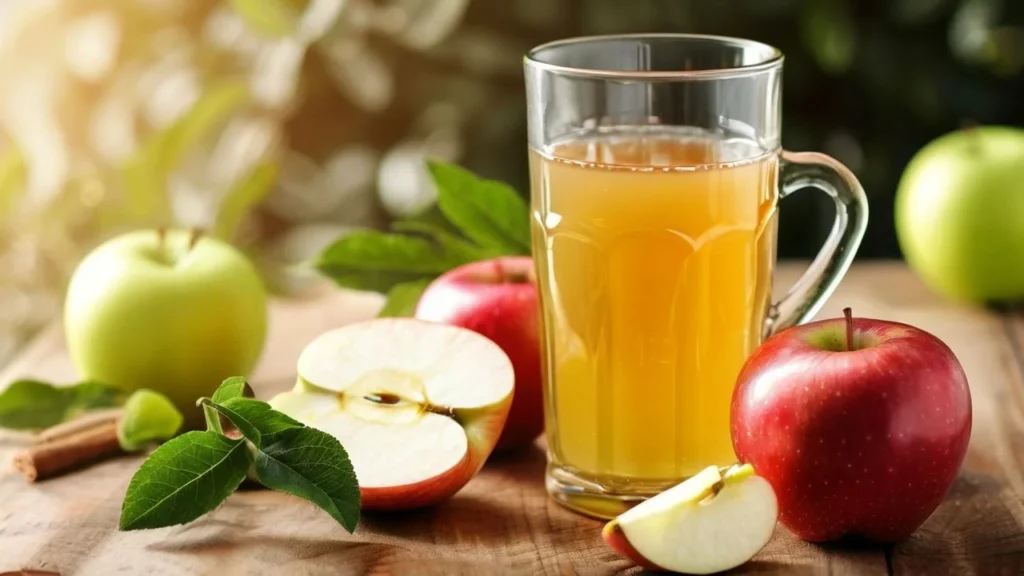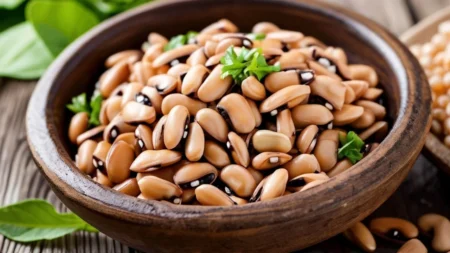Is Apple Juice Good for Weight Loss?
Key Takeaways
- Apple juice can be a part of a weight loss plan when consumed in moderation.
- It provides essential vitamins and antioxidants but is often high in sugar.
- Whole apples are preferable due to their fiber content, which promotes fullness and digestion.
- Balancing apple juice with a diet rich in whole fruits and vegetables can enhance its benefits.

Understanding Apple Juice
Apple juice is a popular beverage made by pressing fresh apples to extract their liquid. The process of juicing can strip away some of the fiber content found in whole fruits, making it essential to understand what you’re consuming.
Nutritional Profile of Apple Juice
An 8 oz serving of apple juice typically contains:
- Calories: Approximately 110 calories
- Sugar: About 24 grams of sugar
- Carbohydrates: Roughly 28 grams
- Protein: 0 grams
- Fat: 0 grams
- Vitamins: Rich in Vitamin C and some B vitamins
- Minerals: Small amounts of potassium and iron
- Antioxidants: Contains beneficial flavonoids and polyphenols
The nutritional composition highlights both the benefits and potential drawbacks of including apple juice in a weight loss diet.
Processing and Its Effects
Many commercially available apple juices are pasteurized and may contain added sugars, preservatives, or flavoring agents. These factors can alter the nutritional value of the juice. To maximize health benefits, consider opting for 100% pure apple juice without added sugars or artificial ingredients.
Apple Juice vs. Whole Apples
When considering weight loss, it’s essential to compare apple juice with whole apples.
Fiber Content
Whole apples are a great source of dietary fiber, containing about 4 grams per medium-sized apple. Fiber is crucial for digestive health, helps regulate blood sugar levels, and increases satiety. In contrast, apple juice typically lacks this fiber, which can lead to quicker digestion and increased hunger.
Satiety Factor
Eating whole fruits like apples tends to be more satisfying than drinking juice. The act of chewing and the fiber content contribute to a prolonged sense of fullness, aiding in appetite control. In a weight loss context, feeling satisfied after meals is essential to reduce the likelihood of overeating later.
The Role of Sugar in Apple Juice
The sugar content in apple juice can significantly impact weight loss efforts.
Impact on Blood Sugar Levels
Apple juice has a higher glycemic index (GI) compared to whole apples, meaning it can cause more substantial spikes in blood sugar levels. This can lead to increased hunger shortly after consumption, making it challenging to manage caloric intake effectively.
Glycemic Index Explained
The glycemic index is a measure of how quickly a food raises blood sugar levels. Foods with a high GI can lead to rapid spikes in blood sugar, followed by crashes that can trigger cravings for more sugary foods. Whole apples have a lower GI, making them a more stable choice for maintaining energy levels.
Recommended Serving Sizes
To mitigate sugar intake, it’s advisable to limit apple juice consumption to one serving (about 8 oz) per day. This approach allows individuals to enjoy the beverage without overwhelming their diet with sugar. If you crave the taste of apple juice, consider diluting it with water or using it as a flavoring in smoothies.
Benefits of Apple Juice in a Weight Loss Diet
Despite its sugar content, apple juice can still offer some benefits when consumed wisely.
Antioxidant Properties
The antioxidants found in apple juice, such as flavonoids and polyphenols, can help reduce oxidative stress in the body. Antioxidants play a crucial role in combating free radicals, which are unstable molecules that can damage cells and contribute to chronic diseases. Reducing oxidative stress may support overall health and improve metabolic functions, which are crucial during weight loss.
Hydration
Staying hydrated is vital for effective weight loss. Apple juice can contribute to daily fluid intake, making it a flavorful alternative to sugary sodas or artificially sweetened beverages. Adequate hydration is essential for various bodily functions, including digestion, metabolism, and even appetite regulation.
How to Incorporate Apple Juice into a Weight Loss Plan
To make the most of apple juice in a weight loss regimen, consider these strategies:
Mix with Water
Diluting apple juice with water can lower sugar intake while retaining the flavor. This method also increases hydration and can reduce caloric intake per serving. For example, mixing one part apple juice with two parts water can significantly decrease sugar and calorie consumption while still satisfying your craving for a sweet drink.
Pair with Healthy Snacks
Combining apple juice with healthy snacks, such as nuts or Greek yogurt, can enhance nutrient intake and promote satiety. This combination provides healthy fats and proteins, which can further help you feel full and satisfied. For instance, a small handful of almonds with a glass of diluted apple juice can be a balanced snack.
Use in Smoothies
Adding apple juice to smoothies can improve taste and provide additional nutrients. Smoothies allow for incorporating fiber-rich ingredients like spinach, kale, or whole fruits, making them a nutritious option. Consider a recipe like this:
- Ingredients: 1 cup of spinach, 1 small banana, 1/2 cup of apple juice, and 1/2 cup of Greek yogurt.
- Preparation: Blend until smooth for a delicious, nutrient-packed smoothie that combines the benefits of apple juice with the fiber and protein of other ingredients.
Explore Alternatives
If you enjoy the flavor of apple juice, consider other options such as whole apples, unsweetened applesauce, or homemade apple juice made with a juicer. These alternatives can provide similar flavors while offering more fiber and nutrients.
Potential Drawbacks of Apple Juice
While there are benefits, there are also some drawbacks to consider.
High Sugar Content
Regular consumption of high-sugar beverages, including apple juice, can lead to weight gain and health issues, such as insulin resistance. When consumed in excess, the sugar from juices can contribute to an increased caloric intake, which is counterproductive for those trying to lose weight.
Lack of Fiber
The absence of fiber in apple juice means it does not contribute to digestive health or provide lasting feelings of fullness. This can be detrimental for those trying to lose weight, as it may lead to increased hunger and cravings for additional snacks or meals.
The Risk of Overconsumption
It’s easy to drink apple juice quickly, leading to higher caloric intake than intended. Unlike eating whole apples, which takes time to chew and digest, juices can be consumed rapidly, making it harder to gauge how much you are drinking.
Making an Informed Choice
When deciding whether to include apple juice in a weight loss plan, consider your overall dietary patterns and goals. Here are a few tips to make informed choices:
Focus on Whole Foods
Prioritize whole fruits and vegetables in your diet. They provide essential nutrients, fiber, and water content that juice lacks. Including a variety of fruits and vegetables can enhance overall health and support weight loss.
Monitor Portion Sizes
If you choose to include apple juice, pay attention to portion sizes. One serving of juice should not exceed 8 oz, and it’s essential to factor it into your daily caloric intake.
Stay Balanced
Aim for a balanced diet that includes a variety of foods. Instead of relying solely on apple juice for sweetness, explore other natural options like whole fruits, berries, and vegetables. These can satisfy your sweet tooth while providing more nutrients.
Conclusion
Apple juice can be included in a weight loss diet when consumed in moderation and balanced with whole fruits. Understanding its nutritional content and incorporating it wisely can help individuals make informed dietary choices. While it offers some health benefits, relying solely on apple juice instead of whole fruits may hinder weight loss efforts due to its high sugar content and lack of fiber.
Incorporating whole fruits like apples into your daily diet, staying mindful of portion sizes, and balancing your overall nutrition can lead to a more successful weight loss journey.
FAQ
1. Is apple juice better than other fruit juices for weight loss?
Apple juice is comparable to other fruit juices in terms of sugar and calorie content, but moderation is key regardless of the type of juice.
2. Can apple juice replace whole fruits in a diet?
No, apple juice should not replace whole fruits, as whole apples provide essential fiber and nutrients that juice lacks.
3. How much apple juice is safe to drink daily?
One serving (8 oz) of apple juice per day is generally safe, but it’s essential to monitor overall sugar intake.
4. Are there any downsides to drinking apple juice?
Excessive consumption of apple juice can lead to high sugar intake and potential weight gain if not balanced with other dietary choices.
5. What are some healthier alternatives to apple juice?
Consider options like whole apples, unsweetened applesauce, or homemade juice that includes pulp for added fiber.










